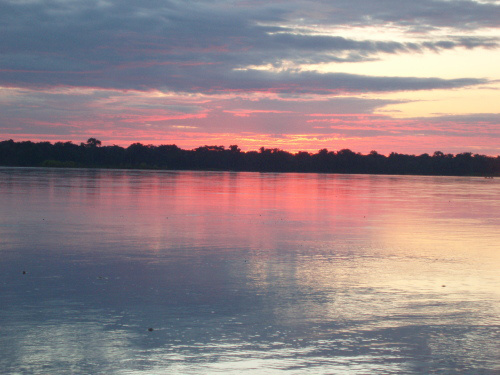latin american integration
IIRSA: A Project of Destruction
The colonos blog has been following the plans and projects for commodity corridors – corredores – in South America unfolding under the IIRSA banner for several years now. IIRSA is a central element in the collaboration between Rafael Correa (Ecuador), Lula (Brasil), Chavez (Venezuela) and Evo Morales (Bolivia) and the rest of South American in the Great Plan to turn the entire continent into an industrial production site. Soon, as sad as it is, one of the key nodes in this network of destruction will be completed: the Interoceanic Highway, connecting the coast of Peru and the coast of Brasil:
Peru: Destructive Amazonian highway near completion
David T. Rowlands
2 May 2009
The nightmarish prospect of a scarred Amazonian jungle reeking of diesel fumes from end to end, as heavy-laden trucks thunder by in round-the-clock convoys, is fast becoming a reality.
Since 2000, teams of road builders have been cutting a vicious swathe of destruction through vast stretches of rainforest in the Peruvian province of Madre de Dios. This is done in the name of “free trade” and neoliberal “development”.
Scheduled for completion in 2010, the Interoceanic Highway will link up with Brazil’s existing Amazonian road network. This will create a coast-to-coast trucking route for Brazilian-based agribusiness exporting soy and other primary products to China via Peru’s Pacific ports.
Eye Witness to Correa’s Profit Mining and Environmental Destruction: No News There!
This is yet another report about industrial activities in Ecuador, a country ruled by an authoritarian, economistic anti-environmentalist, who despises traditional ways of living when it stands in his way of mining and drilling for oil, building roads, riverways and airports, but who loves to present himself – in the media – as a friend of indigenous peoples, wearing traditional outfits and speaking (mountain) Kichwa. Welcome to Correa’s Ecuador:
Locals fight mining in Ecuador’s cloudforest
Christian Tym
Green Left Weekly, 2 May 2009
Many people still speak sincerely about the existence of “corporate responsibility”. While doing volunteer work in the Ecuadorian community of Junin, I got a different picture.
The story of the efforts of Copper Mesa Mining, one of Rio Tinto’s collaborators in gold and copper exploration in Ecuador, to overcome community resistance is an example of what modern “corporate responsibility” looks like.
The mining concession Copper Mesa bought from the Ecuadorian government is centered on the community of Junin and the Intag River.
The proposal was to evict four entire communities, 100 families in all. These people live off their land and depend on the outside world for only electricity and medical supplies.
Mining would destroy their entire way of life.
Correa’s Idiosyncracies, Ecuador’s Collectivities & Pachamama at Winter Solstice
There has been a lot of talk around the world and colonos even get emails from students studying the “very interesting environmental aspect” of the new Ecuadorian Constitution, which gives (human rights-like) rights to Pachamama, which is an Andean (and in some part of the Amazon) term for Mother Earth. (It is derived from Aymara and Quechua.)
Inside Ecuador, however, there is a growing resistance to the project of Correa’s government, largely due to a lack of environmental sensitivity as perceived by the social movements – the environment is systematically subordinated to capital interest – and a lacking recognition of collective rights. Indeed, the new constitution stresses the sacred nature of private property, as has previously been quoted in a post in this blog about the ways in which the constitution was presented in a misleading (half arsed) manner by The Guardian (which should be an autogenerated links below if we’re lucky!?).
In other words, there is a large discrepancy between how foreigners, especially opportunist socialists and social-democracts, perceive and, importantly, choose to represent the politrix of Rafael Correa and his government and how social movements, from peasants through urban anarchists to the people of Amazonia, perceive and resist the programmes of Correa.
As noted again and again – central to much of the criticism we’ve been on about all along – the new constitution also weds Ecuador to the IIRSA project, which is a World Bank project for the integration of infrastructures in Latin America to make it easier for global capitalism to move resources (out), goods (in), labour (around) and people (out if they complain) for the purposes of profit maximisation, asphaltation, bridge building hysteria and river way raping. The Ecuadorian part of IIRSA is first and foremost the Manta-Manaus/Manaos corridor or node in the IIRSA network of commodity trails that threaten to severely further disfigure the Andes and put an end to the world’s largest rain forest, the Amazon or Amazonia.
Anyway, there are a few current articles that make for interesting reading to keep up to date on the Ecuadorian developments, led by the idiosyncratic Correa:
“According to several current and former officials, Correa often makes impulsive decisions in isolation and is reluctant to listen to dissenting views.
“This government is all about Correa and he has closed all space for debate, leading many of us no choice but to leave,” said a close ally who still supports Correa but quit a top post over policy disagreements. “He is ending up alone surrounded only by people who tells him what he wants to hear.“”
Another article deals with financial issues, such as dollarization and the price of oil and how it all hangs together from the perspective of (wanker) financial science:
“Ecuador needs an oil price of $95 to cover all the spending in its budget, according to Barclays. The government had a surplus of $508 million in the first half of the year, Correa said Sept. 20.
“Correa’s only choice for growing the economy is the public sector,” said Bernal at Bulltick. “The lower the price of oil goes, the more the need for Correa to deliver on the fiscal front. Ecuadoreans will only live with Correa as long as they have expectations of growth.”
Then a really useful overview of things provided by an uncommon bed fellow of colonos, Socialist Worker:
“A MORE serious conflict is developing over government environmental policies that benefit mining companies. To crack down on anti-mining protests, Correa has ordered the use of brutal military force, a move bitterly condemned by the social movements.
Even Correa own coalition, Alianza País, is having internal contradictions. Recently, he issued a warning by declaring that he will dissolve the party if more internal infighting continues. He also took the opportunity to define his political project as “an ideological project of the nationalist left.”
But Correa’s nationalism is in opposition to indigenous people’s conception of their own nation, one that stretches across national boundaries from the Amazon to the Andean region. To the extent that indigenous people assert their historic claims to their lands, they are seen as a political threat by both multinational corporations and Correa.
The stakes in this conflict were raised on October 12–Columbus Day, traditionally seen as day of resistance by the indigenous peoples of the Americas. In neighboring Colombia, indigenous groups staged a levantamiento (uprising) to protest government repression and demand more cultural and political rights. The uprising in Colombia inspired indigenous people and their allies throughout the region–including in Ecuador.”
There is also a short piece on Plan Colombia, which is part of the War on Drugs by the Evil Empire and therefore, one might hope, will face some sort of reforms under Obama bin Ltd., and, then, finally some sort of list by Reuter’s, who as usual has been pasting capitalistic-financial propaganda about all the horrible and out of order things anyone left of Henry Kissinger might dare to think or, God help it, act. Just read it in the inverse, as it were :)
Happy Winter Solstice!

UNASURrender to global capitalism
Rafael Correa is the poster boy of neo-socialism – he wears Quechua shirts and bathes himself in the limelight of indigeous peoples’ struggle in the global media, makes promises to the poor and the illiterate (and also delivers on some of his promises) – but more than anything he is increasingly despised by the indigenous peoples and the campesinos “who mean nothing to him” and who he represses violently if they organise against the foreign companies that Correa contracts their land away to. Also known in international socialist and even environmental circles as the saviour of the Yasuni national park. But nothing could be further from the truth – as has been reported by the colonos blog since before Correa entered office.
I have just returned from a meeting where yachaks (shamans) from various regions of “el Oriente” (basically the Ecuadorian Amazon) have gathered all weekend to discuss, among other things, Correa’s rejection in the constituent assembly processes of collective rights and a range of specific demands made by the indigenous movements as part of the rewriting of the Ecuadorian constitution. Talks are of strikes and some suggest that another uprising is brewing – at any rate Rafael Correa is very unpopular with indigenous people and campesinos, because he arrogantly have stated that he cares not about their demands since “they only constitute a few percent of his voters“.
So what does Mr. Correa care about – well, like the Clintons he seems mostly fascinated by inscribing himself into the white man’s history of conquest of the world through an industrial economy that is essentially based on exploitation of labour and pachamama (mother earth).
“Unasur to boost financial self-sufficiency in S America:
BRASILIA, May 23 (Xinhua) — Ecuadorian President Rafael Correa said here Friday that the Union of South American Nations (Unasur) will boost programs to help realize financial self-sufficiency in the region.
After signing the bloc’s constitutive agreement in the Brazilian capital, Correa said it was “a historical day for South America, which brings great expectation and hope.”
“We can do like the European Union (EU). As the EU has to explain why they united, we will have to explain to our children and grandchildren why we took so long to do it,” he told a press conference.”“
Correa’s vision and that of UNASUR is about entrance into an economy that many ever since its inception – with the conquest of new worlds and the industrial production apparatus that makes wars for more profit possible – have been fighting. And for quite some years it has been quite clear that it is a very unsustainable economy that the planet cannot sustain.
Of course it is the rich and the powerful who mostly have to change their wasteful ways, but to happily join that horrible economy that Correa is so blinded by and which accelerates climate change and destroys civilization is plain stupid. However, the middle classes who get better roads (this, the year where it seems like we have to take drastic measure and actions to counter climate change, is the year of asphalt in Ecuador), nicer cars to drive them on and bigger supermarkets to park them by and shop in, and of course the capitalists that exploit the natural resources that he so happily gives to foreign and private interests are laughing all the way to the bank while the earth cries.
The rest of the chinese article follows.

